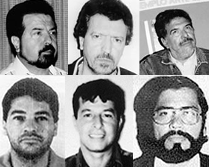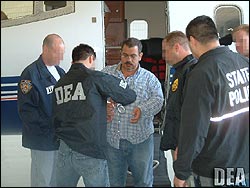Drug barons of Colombia
Drug barons of Colombia refers to individuals who have been significantly involved in the illegal drug trade in Colombia, primarily focusing on the production, transportation, and distribution of cocaine and marijuana. Colombia, due to its geographical location, has been a major player in the global drug trade, particularly in the late 20th century. The country's vast, remote areas are ideal for coca and cannabis cultivation, while its position between the coca-growing regions of Peru and Bolivia and the consumer markets in North America and Europe made it a critical point for drug trafficking operations.
History[edit | edit source]
The rise of the drug barons in Colombia can be traced back to the 1970s, with the emergence of the Medellín Cartel and the Cali Cartel, two of the most powerful drug trafficking organizations in history. These cartels were responsible for a significant portion of the cocaine trafficked into the United States and Europe during the 1980s and 1990s.
Medellín Cartel[edit | edit source]
The Medellín Cartel was founded by Pablo Escobar, the most notorious drug baron in history, along with the Ochoa brothers and Carlos Lehder. The cartel was known for its ruthless approach to dealing with enemies and its innovative smuggling techniques. At its height, it was responsible for up to 80% of the cocaine smuggled into the United States.
Cali Cartel[edit | edit source]
In contrast to the Medellín Cartel, the Cali Cartel was known for its more discreet approach to the drug trade. Led by the Rodríguez Orejuela brothers, the cartel controlled a large portion of the cocaine moving into the United States and Europe in the early 1990s. The Cali Cartel's operations were characterized by their infiltration of Colombia's political and economic systems, using corruption as a tool to protect their interests.
Impact[edit | edit source]
The activities of Colombia's drug barons have had profound impacts on the country and the world. Internally, Colombia has suffered from decades of violence, including assassinations, bombings, and kidnappings, as drug cartels battled each other and the government for control of the lucrative drug trade. This violence has led to thousands of deaths and significant social and economic disruption.
On a global scale, the cocaine trade has fueled addiction and drug-related crime in countries around the world. Efforts to combat the drug trade have led to the development of international law enforcement and military cooperation, such as Plan Colombia, a U.S.-backed initiative aimed at combating drug cartels and insurgent groups in Colombia.
Current Situation[edit | edit source]
While the era of the drug barons like Pablo Escobar has ended, the drug trade in Colombia has not disappeared. It has, however, evolved, with new players and smaller, more decentralized organizations taking the place of the powerful cartels of the past. The Colombian government continues to fight against drug trafficking, with varying degrees of success, and the country remains a significant producer of cocaine.
See Also[edit | edit source]
Search WikiMD
Ad.Tired of being Overweight? Try W8MD's physician weight loss program.
Semaglutide (Ozempic / Wegovy and Tirzepatide (Mounjaro / Zepbound) available.
Advertise on WikiMD
|
WikiMD's Wellness Encyclopedia |
| Let Food Be Thy Medicine Medicine Thy Food - Hippocrates |
Translate this page: - East Asian
中文,
日本,
한국어,
South Asian
हिन्दी,
தமிழ்,
తెలుగు,
Urdu,
ಕನ್ನಡ,
Southeast Asian
Indonesian,
Vietnamese,
Thai,
မြန်မာဘာသာ,
বাংলা
European
español,
Deutsch,
français,
Greek,
português do Brasil,
polski,
română,
русский,
Nederlands,
norsk,
svenska,
suomi,
Italian
Middle Eastern & African
عربى,
Turkish,
Persian,
Hebrew,
Afrikaans,
isiZulu,
Kiswahili,
Other
Bulgarian,
Hungarian,
Czech,
Swedish,
മലയാളം,
मराठी,
ਪੰਜਾਬੀ,
ગુજરાતી,
Portuguese,
Ukrainian
Medical Disclaimer: WikiMD is not a substitute for professional medical advice. The information on WikiMD is provided as an information resource only, may be incorrect, outdated or misleading, and is not to be used or relied on for any diagnostic or treatment purposes. Please consult your health care provider before making any healthcare decisions or for guidance about a specific medical condition. WikiMD expressly disclaims responsibility, and shall have no liability, for any damages, loss, injury, or liability whatsoever suffered as a result of your reliance on the information contained in this site. By visiting this site you agree to the foregoing terms and conditions, which may from time to time be changed or supplemented by WikiMD. If you do not agree to the foregoing terms and conditions, you should not enter or use this site. See full disclaimer.
Credits:Most images are courtesy of Wikimedia commons, and templates Wikipedia, licensed under CC BY SA or similar.
Contributors: Prab R. Tumpati, MD





